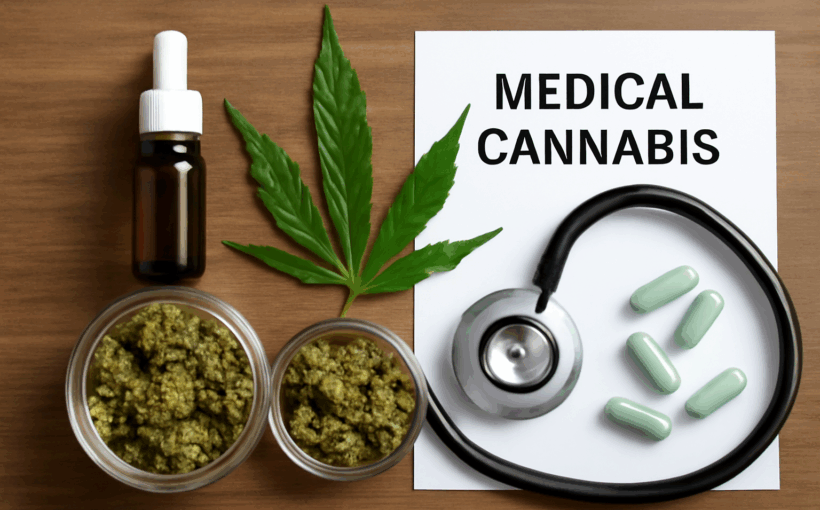Addiction recovery is a long and often difficult journey. Individuals battling substance use disorders (SUDs) face a range of challenges, including withdrawal symptoms, cravings, and the need for emotional and psychological support. While traditional treatments such as therapy and medication play a significant role in helping individuals recover, there is growing interest in alternative treatments—one of which is medical cannabis. In this article, we’ll explore how medical cannabis could potentially aid in addiction recovery and whether it may offer a viable treatment option.
1. Introduction
Addiction recovery is a multifaceted process, often involving both physical and emotional hurdles. For many, traditional treatment methods, such as inpatient rehabilitation programs and counseling, are essential components in regaining control of their lives. However, as addiction rates continue to rise globally, so does the search for new ways to support recovery. One emerging option that is gaining attention is medical cannabis.
With its therapeutic potential, medical cannabis has sparked interest in the addiction recovery community. Its compounds, particularly CBD (cannabidiol) and THC (tetrahydrocannabinol), have shown promise in alleviating symptoms related to addiction recovery. As a result, patients and healthcare providers are beginning to explore how medical cannabis can complement traditional therapies.
2. What is Medical Cannabis?
Medical cannabis refers to the use of the cannabis plant or its extracts for medicinal purposes. It contains several active compounds, but the most notable ones are CBD and THC. CBD is non-psychoactive, meaning it doesn’t produce a “high,” while THC is the compound responsible for the psychoactive effects of cannabis.
Medical cannabis interacts with the body’s endocannabinoid system (ECS), which plays a role in regulating functions such as mood, sleep, and appetite. By affecting the ECS, medical cannabis may help alleviate symptoms associated with a variety of conditions, including chronic pain, anxiety, and even addiction.
3. Addiction and the Brain
Addiction is a complex brain disorder that alters the way the brain processes rewards and pleasure. Substances like alcohol, opioids, and nicotine can hijack the brain’s reward system, triggering the release of dopamine, a neurotransmitter that causes feelings of pleasure and satisfaction. Over time, the brain becomes reliant on these substances to achieve a sense of well-being, leading to tolerance, dependence, and addiction.
See more: Accessible Sleep Testing Clinics in Joondalup
Medical cannabis may have the potential to influence the brain’s reward pathways. THC, for instance, can bind to cannabinoid receptors in the brain, affecting dopamine release and potentially reducing the intensity of cravings. Additionally, CBD has been shown to reduce anxiety, a common symptom during withdrawal, which may support individuals in maintaining their recovery.
4. How Medical Cannabis Might Help in Addiction Recovery
Research into the role of medical cannabis in addiction recovery is still in its early stages, but initial findings are promising. Studies have suggested that medical cannabis can help reduce cravings, ease withdrawal symptoms, and even lower the risk of relapse. For instance, in the case of opioid addiction, CBD has shown potential in reducing opioid use and cravings by interacting with the brain’s receptors involved in pain and addiction.

Similarly, cannabis may help with alcohol dependence. Some studies have found that individuals with alcohol use disorder (AUD) who used cannabis had fewer cravings and experienced less anxiety during recovery. Furthermore, it has been suggested that cannabis can reduce the discomfort associated with alcohol withdrawal, making it easier for individuals to stay committed to their treatment plans.
Medical cannabis may also play a role in treating smoking addiction. Research indicates that cannabis can help reduce the desire to smoke by affecting the same brain pathways involved in nicotine addiction, although more studies are needed to solidify these findings.
5. Benefits Beyond Addiction Treatment
While medical cannabis has potential as an addiction treatment, its benefits extend beyond addiction recovery. Cannabis compounds like CBD have been shown to provide pain relief, making it useful for individuals dealing with chronic pain during recovery. Cannabis may also help stabilize mood, reduce anxiety, and improve sleep, which are essential aspects of emotional and mental well-being during the recovery process.
In addition to addiction recovery, these therapeutic benefits can support a holistic approach to healing. By addressing pain, anxiety, and mood fluctuations, medical cannabis may help individuals focus more effectively on their recovery journey and rebuild a healthy, balanced life.
6. Challenges and Risks
Despite the potential benefits, there are challenges and risks associated with using medical cannabis for addiction recovery. One concern is the potential for misuse, especially with THC, which has psychoactive effects. While medical cannabis may help with cravings, there is a risk that individuals might become reliant on it as a substitute for their previous substance use, leading to another form of addiction.
Moreover, the legal status of cannabis remains a challenge. In many regions, cannabis is still classified as a controlled substance, making access to medical cannabis difficult for those who could benefit from it. Additionally, there is still a lack of standardized dosage recommendations, which can make it difficult for healthcare providers to determine the right approach for their patients.
Lastly, more research is needed to fully understand the long-term effects of using cannabis for addiction treatment. While initial studies are promising, cannabis may not be suitable for everyone, and its potential for long-term dependency on cannabis needs further investigation.
7. What the Experts Say
Addiction specialists and medical professionals have varying opinions on the use of cannabis for addiction recovery. Some experts suggest that cannabis may be a useful tool for certain patients, particularly those struggling with opioid or alcohol addiction. Studies show that cannabis can help alleviate withdrawal symptoms and cravings, making it easier for patients to remain sober.
However, many experts urge caution, emphasizing the need for more clinical trials and research to fully understand cannabis’s role in addiction recovery. Addiction treatment professionals generally recommend cannabis as part of a broader, evidence-based treatment plan, rather than a standalone solution.
8. Legal and Accessibility Issues
The legal status of medical cannabis is a significant barrier to its use in addiction recovery. While some regions, particularly in the United States, have legalized medical cannabis, others continue to restrict access. Patients may need to navigate complex legal landscapes to access cannabis-based treatments, and there may be variations in the availability and quality of medical cannabis products.
For medical cannabis to be more widely accessible as a treatment for addiction recovery, standardized regulations and clear guidelines are necessary. These regulations will help ensure safe, controlled, and effective use of cannabis in treatment plans, minimizing the risks of misuse and ensuring that patients receive the correct dosage.
9. Conclusion
Medical cannabis holds promise as a complementary treatment for addiction recovery, with its potential to reduce cravings, ease withdrawal symptoms, and improve overall well-being. While more research is needed to fully understand its effectiveness and long-term risks, cannabis could serve as a valuable tool in managing addiction, particularly for individuals who have not responded well to traditional treatments.
Ultimately, medical cannabis should be considered as part of a comprehensive, individualized treatment plan. As with any therapy, it is important to consult with a healthcare provider to determine the best course of action. With continued research and regulation, medical cannabis may play an important role in the future of addiction recovery.

